#jose esteban munoz
Text
“We can understand queerness itself as being filled with the intention to be lost. Queerness is illegible and therefore lost in relation to the mind’s mapping of space.”
— José Esteban Muñoz, “Cruising Utopia: The Then and There of Queer Futurity”
#queer stuff#Jose Esteban Munoz#queer temporality#quote#cruising Utopia#the future#possibility#liminal#liminality
16 notes
·
View notes
Text
Also thinking about the ephemeral nature of kim and jimmy’s relationship. they, particularly kim, do not strike me as outwardly sentimental people. jimmy is a water sign and wears his heart on his sleeve that we know but the only relationship keepsake, the only physical evidence of kim and jimmy, that is ever really in the show is the zafiro anejo stopper. And that stopper isn’t exactly glaringly obviously a relationship sentiment. To anyone looking in, you can’t decipher the history behind it. We never see physical evidence of the photo huell takes of them in 5.07. There is no real evidence that kim and jimmy as a unit ever really existed. It’s not like they were leaving romantic paper trails during their scams. And with the amount of people who truly knew kim and/or jimmy diminishing smaller and smaller as years go on, less and less people even knew that they were something. That they loved each other desperately. Do you think that jesse or walt would have believed that saul goodman had been deeply in love and married to someone like kim, that he lived such a vibrant different life before they met him? mike never acknowledges the person saul was before (at least we never see it). if there is no physical evidence, no person who remembers who you were and who you were in love with, except for you and that other person but she’s hundreds of miles away in florida pretending she’s never known you, did it really happen? how do you know that it was real, that it wasn’t just a vivid dream? What those two were to each other lives on in memory only for so so long. i can only hope that post canon they find ways to plant deep deep roots once they’re no longer hiding from things outside of each other
#olivia’s corner#DOES THIS WVRN MAKE SENSE DHAJDJWJD#the concept of ephemera is so fascinating to me#jose esteban munoz and queer studies live forever in my brain and made me think of mcwexler#better call saul#mcwexler#jimmy mcgill#kim wexler#saul goodman#like do u get what i mean#oh well#i could be missing something huge and this really doesn’t make sense then#once again oh well
23 notes
·
View notes
Text
As many theorists have observed, the political landscape has changed dramatically in the two decades since queer theory emerged. The assimilation of gays and lesbians into the cultural, legal, and social mainstream has complicated the early identification of sexual non- normativity with political subversion, provoking urgent debate about the conceptual viability of the homosexual as a “revolutionary agent, or as the harbinger of a new era”. As David Eng, J. Halberstam, and Jose Esteban Munoz observed in the intervention, “What’s Queer About Queer Studies Now?,” “While in prior decades gays and lesbians sustained a radical critique of family and marriage, today many members of these groups have largely abandoned such critical positions, demanding access to the nuclear family and its associated rights, recognitions, and privileges from the state. That such queer liberalism comes at a historical moment of extreme right- wing nationalist politics should give us immediate pause.” Eng, Halberstam, and Munoz’s call for a “continuing critique” locates its urgency in the pervasive sense, shared by scholars across a broad interdisciplinary spectrum, that, in spite of its proclaimed radicalism, the tools that currently make up the queer theoretical canon are consistently failing to disrupt established positions and ideologies. This concern with the future of the field and challenge to its dominant rhetorical and intellectual tropes contribute to the momentum generated by a younger generation of queer scholars who are actively confronting the limits of queer epistemology and methodology.
Gila Ashtor, Homo-Psyche
4 notes
·
View notes
Text
What I'm here for.
This year Stockholm’s Cinema Queer Fest is centered around rage. Since attending the program release I have been haunted by the reality of rage. There is a James Baldwin quote that is now breath to me and it goes like this: “To be a negro in the country and to be relatively conscious is to be in a rage almost all the time.” Rage and anger are familiar to me. I am learning to make space for them in the world, to make them other people’s problems and not just my own, but this ancestry of rage, community of rage, is new to me. I am also now interested in how to make this rage productive, not merely in my interpersonal life, but to direct towards real change and manifestation. I think it is possible, but I am also only twenty years old and my life is in constant transit.
After rage, Baldwin began following me around. He appeared as an excerpt in one of the most god-awful books I’ve had to read yet in my college career, but the little indented quotation of his power moved me so thoroughly that I began hunting him down rather than waiting for him to find me. I bought Giovanni’s Room earlier this year, but I’m still trying to finish Song of Solomon (which has been an excellent read so far). I desperately wanted Baldwin’s voice, though, the intense degree to which he could evoke emotion, his masterful ability to suck me in swiftly, into the worlds that still brutally reflect our own. I took myself out to a cafe in Sofo and I wanted to wander around after I finished my work. I looked really good that day, and I felt it would be a shame just to go back and rot in my room. It was also sunny out. I came across an English bookstore just a block over from the cafe I was at and began my hunt for Baldwin.
I got Giovanni’s room at the Open Bookstore in Chicago, alongside a pocket copy of Susan Sontag’s Notes on Camp. It was hands down maybe the best bookstore I’ve ever been to (although one of the staff recommendations was Tender is the Flesh and I think that book is awfully written). Maybe I’ve only ever been to shitty bookstores, but this one had a fantastic selection that not only met some of the more obscure texts on my reading list but also added many more books to that list. The little English bookstore I found definitely falls under the shitty selection, but they did have two books by Baldwin. I had already read his short story Going to Meet the Man so I bought the overpriced copy of Jimmy’s Blues and Other Poems. I have a limited amount of books I brought from home here, and my copy of Sylvia Plath’s Collected Poems did not make the cut. I’ve been missing having a bedside book of poetry, and the slim size of the book wouldn’t be obtrusive when I inevitably pack to go home. It’s been a couple of weeks since then and someone else in my life has been consuming a lot of space in my mind which takes me to my next musing.
James Schuyler’s A photograph is nestled within Jose Esteban Munoz’s Cruising Utopia. Schuyler’s poem whisked me away in a similar fashion as Baldwin’s excerpt, except my obsession was with ecstasy and not rage. The type of ecstasy Schuyler is getting at, and the one I’ve reflected the most on is that kind of feeling of looking back with joy. I feel rage more often than I feel ecstasy, but life has been pretty good for me recently. When I went swimming with friends a couple of weeks ago I remember looking back at the sunlit shore, at all our clothes and belongings messily strewn about in our haste to get in the water, and I was seized by such joy that I did not care that much when a large wave washed in and almost took all my belongings into the water. I have few moments in my life that inspire ecstasy, or rather sometimes it is just hard to find them, but in some moments they wash upon me and I am whisked away.
I like thinking of rage and ecstasy in this simultaneous fashion. They make sense together, for it is maybe in this life where I am so filled with rage that these moments of ecstasy are so beautiful and so simple. I forget them so easily and yet they continue to find me in soft and quiet ways. The rage makes me desire ecstasy, want to fight for it and to know this is a reality we are all entitled to have. This blog will be a disorganized journey of this fight and exploration. I’m interested in black punk, black poetry, and black rage and what any of this has to do with how we manifest action into our lives.
0 notes
Text
Media Workout: Teofimo Lopez Set for Takeover 2.0 Against Pedro Campa
(adsbygoogle = window.adsbygoogle || []).push({});
Follow @Frontproofmedia!function(d,s,id){var js,fjs=d.getElementsByTagName(s)[0],p=/^http:/.test(d.location)?'http':'https';if(!d.getElementById(id))(document, 'script', 'twitter-wjs');
Published: August 11, 2022
LAS VEGAS — The Takeover 2.0 is ready for liftoff.
Former lightweight king Teofimo Lopez hopes to conquer a second-weight class. That journey begins Saturday against Pedro Campa in the 10-round junior welterweight main event at the Resorts World Event Center at Resorts World Las Vegas.
In the eight-round co-feature, unbeaten Puerto Rican junior middleweight standout Xander Zayas takes on Elias Espadas. Lopez-Campa and Zayas-Espadas will be broadcast live on ESPN, ESPN Deportes and ESPN+ at 10 p.m. ET/7 p.m. PT.
The undercard — streaming live and exclusively on ESPN+ — includes the return of Las Vegas-born junior lightweight contender Andres Cortes against the bruising Abraham Montoya. Promoted by Top Rank, tickets starting at $40 are on sale now and can be purchased at Etix.com.
Lopez, Campa, Zayas, and Cortes kicked off fight week Wednesday with a media workout at the Top Rank Gym.
Lopez (16-1, 12 KOs), whose run up the lightweight ranks included a legacy-defining victory over Vasiliy Lomachenko, went through the paces for more than 30 minutes. He hit the mitts with his father/trainer, Teofimo Lopez Sr., and even conducted an impromptu pushup session in the middle of the ring. Following last November's split decision loss to George Kambosos Jr., he sets his sights on Campa (34-1-1, 23 KOs), an accomplished veteran who is 7-0-1 since the lone defeat on his ledger.
Saturday, August 13
ESPN, ESPN Deportes & ESPN+ (10 p.m. ET/7 p.m. PT)
Teofimo Lopez vs. Pedro Campa, 10 rounds, Vacant NABF & WBO International Junior Welterweight Titles
Xander Zayas vs. Elias Espadas, 8 rounds, Vacant NABO Junior Middleweight Title
ESPN+ (6:40 p.m. ET/3:40 p.m. PT)
Jose Enrique Vivas vs. Edy Valencia, 8 rounds, featherweight
Andres Cortes vs. Abraham Montoya, 8 rounds, junior lightweight
Troy Isley vs. Victor Toney, 6 rounds, middleweight
Duke Ragan vs. D'Angelo Fuentes, 6 rounds, featherweight
Omar Rosario vs. Esteban Munoz, 6 rounds, junior welterweight
Charlie Sheehy vs. Juan Castaneda, 4 rounds, lightweight
(Featured Photo: Mikey Williams/Top Rank via Getty Images)
0 notes
Text
The key to queering evidence, and by that I mean the ways in which we prove queerness and read queerness, is by suturing it to the concept of ephemera. Think of ephemera as a trace, the remains, the things that are left, hanging in the air like a rumor.
Cruising Utopia by José Esteban Muñoz
8 notes
·
View notes
Photo
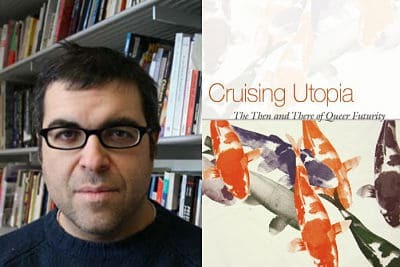
José Esteban Muñoz (deceased)
Gender: Male
Sexuality: Queer
DOB: 9 August 1967
RIP: 3 December 2013
Ethnicity: Cuban
Occupation: Academic, writer
#José Esteban Muñoz (#Jose Esteban Munoz#lgbt history#queer history#lgbtq#male#queer#1967#rip#historical#cuban#poc#hispanic#academic#writer
71 notes
·
View notes
Text
Beautiful City -- A Theological Ramble on “Godspell” -- Pt. II: Fluidity, Utopia and the Kingdom of God
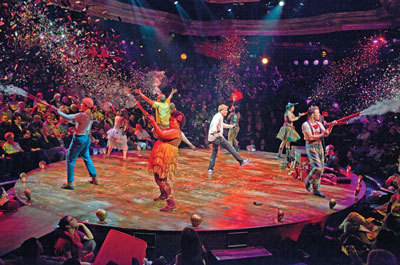
Go to Pt. I
In continuing to share my thoughts on Godspell (2011), I want to reflect on the queer potential of this musical, and how its construction of the apostolic community works on multiple levels. Fair warning, this will probably be the most fluid piece in the series since it’s kind of a grab bag of ideas and sensations that come to me when I think about this musical. They’re loosely connected around the themes in the title of this piece, but I don’t have an academic point by point argument so much as what I hope will be an evocation of what this musical does.
Godspell is a pretty non-linear musical. It does follow a loose plot of the life of Jesus, and it has key moments that move us through the gospel narrative, but the show is very fluid with its use of time and space. Apart from the baptism scenes, Jesus saving the woman from stoning, and the passion narrative, the majority of the musical is parables and teachings of Jesus, some performed in skits, some performed in song. One would think this would make for a rather aimless musical, and it’s certainly not everyone’s cup of tea. But ultimately it succeeds for me on its fluidity and its heart.
Rather than capturing the content of the events in its plot, Godspell captures in living color the feeling, the affect, the sentiment of being in its plot. The vaudeville aesthetic, the improvisation, the bombastic gospel numbers, all of these elements served to make me feel like I was part of the band of apostles. Like I was part of a small but scrappy movement centered around this Jesus, the God-man who brought a dying world back to life just by the way He lived and moved within it. Back in high school, I was part of a church youth group where I made some of my closest friendships and went through some of my most important spiritual struggles. The passionate pursuit of meaning and relationship, the wrestling with truth and love that me and my friends did there, all of these things felt like a faint echo of what it must have been like to have been a part of Jesus’ earthly chosen family, a family that has only grown bigger over the centuries.
In another piece on this blog, I wrote about how the musical Cats succeeds as a queered musical by being dreamlike, playful and charged with the extravagance and decadence of queer celebration. Godspell has a similar fluid quality, but unlike Cats, it delights in an earnestness devoid of extravagance. It captures the hope and tenderness of the gospel kerygma. At a non-sectarian level, this core essence is the idea that a group of people united by their love for one another and their earnest desire to pursue liberation, righteousness and solidarity can truly change the world, can build “a beautiful city” in the midst of a world of pain. From a Christian perspective, it is all this and the added wonder that God became human and shared in an intimate communion with human flesh and human society, to make us into a new kind of being, participants in the life of the Trinity. The life of a Triune God who is liberation, righteousness, justice and the most tender, compassionate love.
In a way, the whole musical is charged with the Alexandrian sensibility of divine-human fluidity, as discussed in the first part of this series. Godspell, like Jesus himself, queers the line between what is human and what is divine. It reaches towards what queer theorist José Esteban Muñoz calls “the then and there.” Queerness is not only a transgression of definitions (though it is that), it is also a yearning towards a “then” and a “there,” a way of living in the world that we catch glimpses of where “man’s [sic] clouded sun shall brightly rise/and songs be heard instead of sighs.” This divine-human queering is displayed most powerfully in the finale of the show, after Christ’s body is taken down from the cross. “Long live God” is sung, along with the refrain of “Beautiful City,” and a reprise of “Prepare Ye.” God lives, and the disciples find new life as they go about the work of preparing the way for the Kingdom, for this new reality of love which God will complete. To participate in the life of the Resurrection is to pursue theosis, the ultimate queering of divinity and humanity, where we seek to live in ways that echo the person-and-work of Christ, and yet are transformed by the power and love of God which moves beyond our mortal capacity, bringing us to immortality. We commune with the Trinity through our likeness to Christ, and in so doing, we become divine-and-human.
In a secular view, this “then” and “there” is always something that we lean towards, that shows us how the world could be and critiques the imperfections of how it is. But it is ultimately something that will never be fulfilled. In a Christian view, there is a hope and a trust that the Kingdom of God will indeed be that “then and there,” and we lean now towards the “not yet” of God’s fulfillment by leaning into the beauty of the “already,” where the queer divine breaks into our midst.
Ultimately, according to Orthodox theology, even the Kingdom of God is not a static end state. It is a dynamic, unfolding, evolving reality, something that will be consummated at the return of Christ but will continue to blossom and grow like a flower. This is the meaning of the term epektasis, perfection as continual transfiguration and dynamism rather than stasis.
The Kingdom is epectasic. Queerness is epectasic. And somewhere in the meeting between the two is the fullness of my being as a queer Christian.
In the next part, I’ll move to a more specific discussion of the relationships between the characters, and a few personal theories on how they speak to queer community, Christian community, and the communion of love between human beings.
#Beautiful City#series#hot take#theology of media#queer theology#Eastern Orthodox#Godspell#Theology of Theater#pt II#Christology#eschatology#queer theory#Jose esteban munoz#resurrection#kingdom of god
15 notes
·
View notes
Text
corvidfeathers replied to your post “Am I the only one who's like... outrageously uncomfortable seeing...”
this is such an insightful post and rundown im excited to read more abt disidentification!
no problem!! i really like munoz and think his work was fantastic (and hugely applicable outside of strictly academic spaces) ✨
7 notes
·
View notes
Quote
Some will say that all we have are the pleasures of this moment, but we must never settle for that minimal transport; we must dream and enact new and better pleasures, other ways of being in the world, and ultimately new worlds.
José Esteban Muñoz, Cruising Utopia: The Then and There of Queer Futurity
#quote#José Esteban Muñoz#Jose Esteban Munoz#Cruising Utopia: The Then and There of Queer Futurity#Cruising Utopia#lit#non fiction#quotes#*
119 notes
·
View notes
Photo
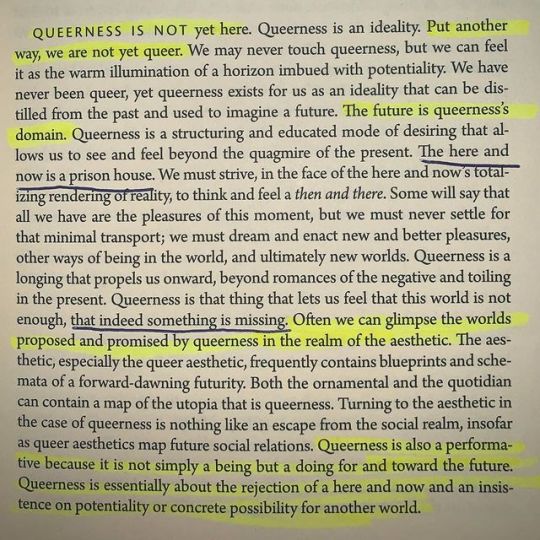
“rowanblanchard: I wasn’t sure if I was going to post anything this month that could be interpreted as capitalist pride or worse, as activism because as you can probably tell from the minimal posts on this page: I have mixed feelings about my previous time performing social justice online and the fact it allowed me and many to address themselves as activists when maybe that word has lost its meaning, and isn’t something I choose to identify as now or am willing to readopt. I am also hesitant because I’m aware of the inferred empowerment that is encapsulated in the word pride, which isn’t something many queers can access, or even something we should necessarily want in the same way under the terms of the white supremacist, queer and transphobic cop state and society we live in daily. Pride on this app feels dizzying and covered in campaigns and rainbow objects we can buy, pride in 2019 feels like it doesn’t really belong to queers anymore but to the state, so before I go too deep down this rabbit hole: I wanted to share the opening paragraph from a book @hi_its_bobbi recommended to me when I was first coming to terms with the layers of my own identity: Cruising Utopia by José Esteban Muñoz. With the majority of visible queerness/ pride this month being of the kind that some straight cis corporation is profiting from I wanted to share something that suggests queerness is the unseen, the invisible, the utopian, the future and that there is an uncolonized world of it that we haven’t touched yet, that belongs not to cops or corporations or tee shirts or to America but to us. I’m grateful for every way queerness has shaped my lens on the world, and for every trans, queer, and non binary person who can’t interact with visibility or outness in the same way that is reflected to us on this app. We see you 👀 🖤 If you are buying something rainbow themed this year, instead give ur money directly to the go fund mes or Venmos belonging to trans women of color and non binary pocs, whose historical fight is responsible for the state/cop rebellion called pride in the first place. Love u 😘”
<3
#rowan blanchard#pride#pride month#activism#cruising utopia#jose esteban munoz#queerness#queer futures#my girl
42 notes
·
View notes
Text
Boşluğa Atlamak: Muñoz’u Kaybederken Bulmak
-Queer çalışmalarına katkılarıyla tanınan kuramcı Jack Halberstam’ın akademisyen José Ésteban Muñoz’un ölümünün ardından kaleme aldığı mektup-
Jack Halberstam, Güney Kaliforniya Üniversitesi
Bazıları, José Ésteban Muñoz’un zamansız öldüğünü söyleyecek; genç yaşta, daha yapacağı çok şey varken öldüğünü. Fakat, queerlığı yokluğundan menkul, yitik geçmişin içinde mevcut bir oluş biçimi, ulaşılmaz geleceğin çağrısı olarak ifade etmesi gibi Muñoz; bizzat seçmediği ama ısrarla onu seçen bir queer devrin içinde, nasıl yaşadıysa öyle öldü. Hakkında yazdığı queer sanat dünyasının egzotik müştereklerinin yaptığı gibi Muñoz, henüz ve dahi hiç gelmez bir o zaman ve orası uğruna, şimdi ve burada olan herşeyi feda etti. Jack Smith’in tamamlanmayacak bir performansa geç gelişinde ya da Fred Herko’nun son performansında arkadaşının evinin penceresinden ‘kusursuz bir sıçrayış’ gerçekleştirmesi sonucu aramızdan erken ayrılışında (Cruising Utopia, 148) olduğu gibi, Muñoz ani gidişiyle hepimizi şaşırttı, bizi geride üzgün ve yoksun bıraktı. Muñoz’un gidişi ileri sıçramak ya da hayatı göğüslemekten geri durmak değildi; içinde bulunduğu zamana, şimdi ve buradaya ilişkin mecalini kaybederken, bir başka aleme ilişmeye yarayacak bakışlar sunan biricik anlar etrafında hızla dönen bir yaşamın, ani sonlanışıydı.
Muñoz’un erken ölümünü kendi işleri üzerinden bir reddetme jesti, zamansallığı reddetme olarak anlamamız mümkün olabilir mi? Cruising Utopia’nın ‘Bir Camdan Sıçrayış bölümünde José, Fred Herko’nun intiharını, sanatçının son performansı olarak yorumlar. Jose, artı değer kavramı kullanarak kapitalist devinimi alteden eylemleri, üretimleri ve oluş biçimlerini ele alırken Herko’nun boşluğa atlamasını, aşırı bir jest olarak okur; bu jest, lüzumsuz, çocuksu, savruk, anlamsız gözükebilir ama kapitalizmin ve kapitalist zamansallığın öne sürdüğü herşeyi tam anlamıyla reddeder. Queer estetiğin üreyişinde birbirine yanaşan red ve kaçışın, alt edilmiş bir zamansallıkta ‘geç’ ve ‘erken’ kavramlarını, bilakis, devre dışı bıraktığına dikat çeker.
Ayrıca, kuir alemlerden içeri aşırılık ve yitimin yan yanalığı ütopik hayal gücünün güçlü kanıtlarıdır. Queer düşsel ideal dünyaya şimdi ve burası üzerinden ulaşamaz; fakat onu boşluğa meyleden sapkın, riskli, yaban s��çrayışlar ile çağırır. Ütopik olanın bu şekilde kavramsallaştırılması, sanatı su yüzüne çıkabilecek ya da çıkmayabilecek arazilere rehberlik yapacak şekilde konumlandırır. Muñoz, sanatın bu rolünü bize Ernst Bloch üzerine yaptığı hünerli okumalarla hatırlatmıştı. Muñoz’un anlattığına göre Bloch sanatı, ‘henüz buraya gelmemiş, bir başka oluş tavrının aleminden ‘ön-gözükmenin icrası’ olarak konumlandırmıştı (147). ‘Henüz burada olmayan’, tıpkı ‘yitip gitmiş’ olan gibi, geçmişin hayaletlerinin, geleceğin ışıltılarının, yolu gözlenen ve yitirilenlerin işaretiymişcesine, başka imkanların hızlıca gözüküp yittiği, yamuk zamansallıkları temsil eder.
Fred Herko’nun arkadaşının penceresinden boşluğa, ölümü kucaklayan sıçrayışı, Muñoz için, izah, idrak ve akılsallığa karşı koyan bir performansı gösterir; bu performans, kapitalist birikim mevhumuna ve kapitalist mantığa karşı koyar. Sarılması gerekeni üzerinden atar ve korkulana sarılır. Mutlak bilinmezliği ve kırılganlığıyla mükemmeldir. Herko’nun boşluğa kontrollü bir şekilde sıçraması, ölüme doğru kontrolsüz bir düşüşü sanat yapar. Ve Herko’nun son dansı, queer sanatı yaşamın kendisine ters bir ilişkide pozisyonlandırır. Eğer yaralanabilirlik, kural dışılıkla, hasar görmekle ilişkiliyse, o zaman queer acı, tahribat ve korkunun koşullarını kimlik tertiplerine değil, yaban tecessümlere açılan yollar olarak, yeniden, katetmeye çalışır.
Dolayısıyla, José Esteban Muñoz’un yasını tutmuyorum; onun zaman, imkan ve olasılıkları sezen yaban bakışını kutlamak istiyorum. Cruising Utopia’da ‘Queerlık henüz burada değil,’ yazmıştı. ‘Queerlık düş(ün)seldir . Başka bir deyişle, biz henüz queer değiliz. Queerlığa hiçbir zaman dokunamayabiliriz ama queerlığı olasılıklarla dolu bir ufuğun sıcak aydınlanması olarak hissedebiliriz. Hiçbir zaman queer olmadık ama queerlık hepimiz için geçmişten damıtılmış ve geleceği hayal etmek için kullanılan bir düşüncellik olarak var olmaya devam ediyor’ (1). José, yaşamında olduğu gibi ölümünde de bizi, özgün bir yetkinlikle görebildiği, tarif edebildiği ve dokunabildiği ‘ufuğun sıcak aydınlanması’na yaklaştırıyor. Bu ufkun sanat olduğu kadar ölüm olduğu gerçeği bizi uzanıp onun aydınlığına bakmanın tadını çıkarmaktan vazgeçirmesin.
Çeviri: Merve Ünsal
Son okuma: Derya Bayraktaroğlu , Deniz Gül
Deniz Gül’ün “Kazı ve Yüzey” çalışmasının Çeviri programı için Derya Bayraktaroğlu tarafından seçilmiştir.
0 notes
Text
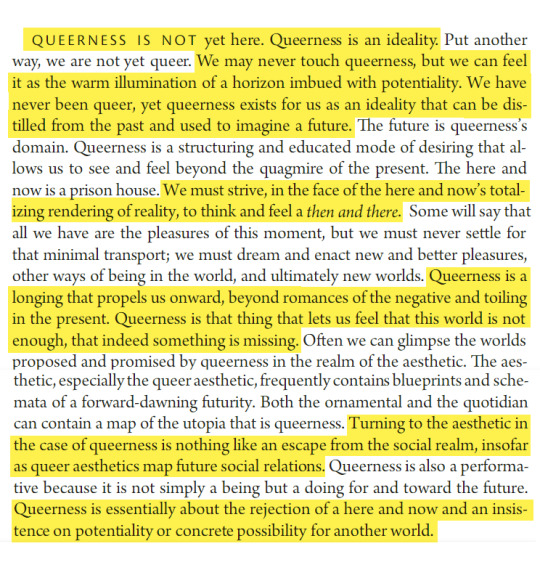
Jose Esteban Munoz, Cruising Utopia: The Then and There of Queer Futurity
150 notes
·
View notes
Text
why have i seen ways of seeing cyborg manifesto and jose esteban munoz all on my dash in the last day Who broke into my canvas syllabus and started posting it
4 notes
·
View notes
Photo
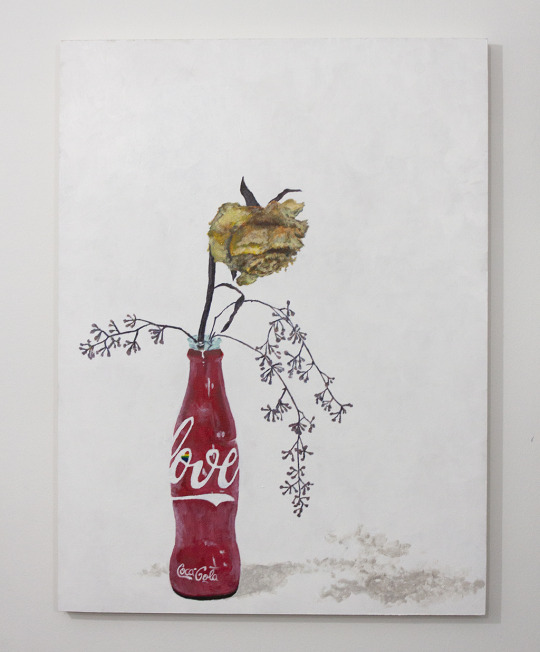
The Now of Queer Futurity
[Alternative Text: A mostly white painting hangs on a white wall. The painting shows a classically shaped Coca-Cola bottle with the word love scrawled across the front. In the bottle there is a yellow rose that is somewhat wilted, so it is slumped over. There are some other plant branches coming out of the bottle and there’s light gray shadow of the objects along the bottom.]
Artist Statement: Advanced by Jose Esteban Munoz’s writing in Cruising Utopia: The Then and There of Queer Futurity, Warhol's work Still Life (Flowers) can be read as queering a Coca-Cola bottle by adding a flower to it. My work offers an examination of this concept in the modern day. It provides a commentary on Coca-Cola’s participation in pinkwashing queer pride. Pinkwashing in the context of pride is companies using sponsorships to improve public relations and plastering products with rainbows to profit while not contributing to or actively fighting against systemic change.
#painting#cocacola#rose#still life#warhol#cruising utopia#pinkwashing#acrylic#artists on tumblr#queer#flower
20 notes
·
View notes
Text
Frenchie Davis
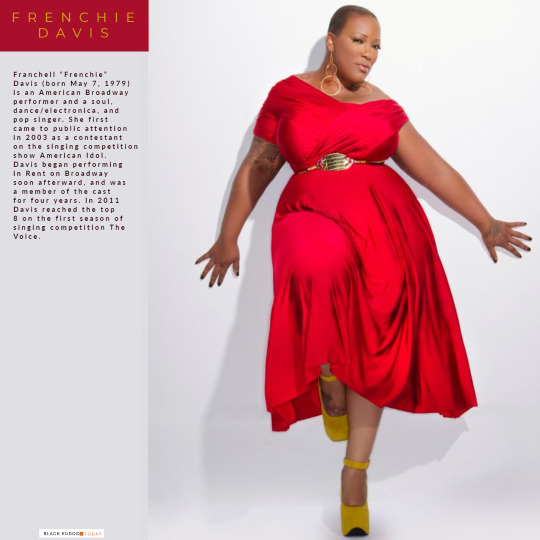
Franchell "Frenchie" Davis (born May 7, 1979) is an American Broadway performer and a soul, dance/electronica, and pop singer. She first came to public attention in 2003 as a contestant on the singing competition show American Idol. Davis began performing in Rent on Broadway soon afterward, and was a member of the cast for four years. In 2011 Davis reached the top 8 on the first season of singing competition The Voice.
Early life and career
Davis was born in Washington, DC and raised in Los Angeles, CA. She graduated from Howard University in 2014 with a Bachelor of Fine Arts.
In the year 2000, she began her performing career in productions of Little Shop of Horrors and Jesus Christ Superstar with the Freilichtspiele Theatre Company in Schwabisch Hall, Germany.
American Idol
Davis was a contestant on the second season of American Idol in 2003, but was disqualified early in the season due to topless photos taken earlier in her career.
According to Davis, she was up-front about her pictures:
"When I first discovered that I had made it to Hollywood and found out I would be competing to get into the top 30 and then later in the top 12, they had given us all this paperwork to fill out, background checks and that whole thing. So when we were doing that I had a discussion with some members of the production staff and I exposed to them a piece of my past; that when I was 19 years old, I took some pictures and that’s not the person I am [anymore]. I wanted to be up-front about it. We talked about it and then nothing happened".
The Idol staff took no action then, but two months later, they decided that Davis's participation would be inappropriate. "They had decided that because American Idol was a family show, that they could not have me on the show because of the pictures I had taken –though they had never seen the pictures," she told EuroWeb. She also added that no one was able to find the pictures in question as the website that featured them had been taken down.
Double-standards controversy
In 2007, revealing pictures of season six American Idol contender Antonella Barba surfaced on the internet, but Barba was kept on the show (though she was voted off shortly afterward). Many drew parallels to Davis's earlier situation. In an interview conducted for The New York Post on Monday, March 5, 2007, Davis said,
"I couldn't help but notice the difference between the manner in which she was dealt with and how I was dealt with.... I think it's fantastic if
Idol
has evolved, and I think it's fantastic she won't have to go through what I went through four years ago … but if the rules have changed, I believe there should be something to make up for the fact that I was humiliated needlessly."
The discrepancy was discussed on talk show The View on March 6, 2007. Co-host Elisabeth Hasselbeck argued that the difference was that Davis was paid for her pictures whereas Barba was not. Co-host Rosie O'Donnell disagreed, saying, "I think it's racist. I do... I think it's because she's black". American Idol was also accused of racism by Project Islamic H.O.P.E. activist Najee Ali: "obvious that it's a racial bias... when you have a situation where a black contestant is punished and a similar situation happens to a white contestant and there is no punishment and they're allowed to continue on the show."
Post-Idol career
After American Idol, Davis appeared in the Broadway musical Rent in 2003. She sang the solo in the opening song of Act Two, Seasons of Love, and in ensemble roles such as Mrs. Jefferson (Joanne's mom), a woman with bags, a coat vendor, Mrs. Marquez (Mimi's mom) and others. She also occasionally played the part of Joanne. On June 1, 2005, Davis returned to her previous role in the Broadway production of Rent. Davis had previously announced that she would leave Rent in May 2007, but announced her final performance following a mid-April 2007 show. During the weeks leading up to the April 29 performance of Rent's 10-year reunion, Davis appeared in an iTunes Podcast (Rent: The PodCast). She also joined the original cast for a special encore performance.
In 2004, Davis was cast in the role of Effie in a West Coast-touring production of Dreamgirls, which appeared in Sacramento, San Jose, and Seattle, and later went to the Pittsburgh Civic Light Opera.
From August 3–19, 2007, Davis starred alongside Miche Braden and JMichael in the role of Mahalia Jackson in the Hartford Stage production of Mahalia: A Gospel Musical, written by Tom Stolz and directed by Jeremy B. Cohen.
In 2008, Davis, along with fellow second-season American Idol participants Ruben Studdard and Trenyce Cobbins, starred in the 30th-anniversary national tour of the musical revue Ain't Misbehavin'. The tour ran until May 2009, and was nominated for a Grammy award in the Best Musical Show Album category.
In the fall of 2010, Frenchie was cast in the role of the Fairy Godmother in Rodgers & Hammerstein's Cinderella (Enchanted Edition) at the Berkeley Playhouse, the resident theatre company at the Julia Morgan Center for the Arts in Berkeley, California.
The Voice
In 2011, Davis competed in the first season of reality competition series The Voice. In the first episode, she performed "I Kissed a Girl" by Katy Perry, advancing to the next round as a member of mentor/judge Christina Aguilera's team of 8.
On the May 10 episode, Frenchie competed in a sing off against Tarralyn Ramsey, both singing "Single Ladies (Put a Ring on It)" by Beyoncé. Frenchie won and made it to the next round.
On the June 7 episode, Frenchie performed "When Love Takes Over" by David Guetta and Kelly Rowland. She was told, "You may very well have the strongest voice in this whole competition."
In the next week, it was announced that Frenchie did not win the fan vote from the previous week's performance, which would have allowed her to move on in the competition. However, Aguilera used her own vote to move Frenchie onto The Voice's Elite 8.
On the June 21 episode, featuring the Showdown of the Elite 8, Davis performed "Like a Prayer" by Madonna.
Frenchie Davis was eliminated during the semi-finals, finishing fifth overall. She did, however, join the other members of the final eight contestants of the show: Javier Colon, Dia Frampton, Vicci Martinez, Beverly McClellan, Casey Weston, Xenia and Nakia on a U.S. tour summer 2011.
Post-Voice career
In December 2012, Frenchie starred in the musical God Doesn't Mean You Get To Live Forever at the Baruch Performing Arts Center in New York with legendary pastor Dr. James A. Forbes Jr. and Gregory Charles Royal. In 2014 she made her film debut in the comedy film Dumbbells.
In 2017, Davis starred as Henri in The View UpStairs - an off-Broadway musical about the UpStairs Lounge arson attack that killed 50 patrons of a gay bar in New Orleans. She was also a winner of the Jose Esteban Munoz Award from CLAGS: the Center for LGBTQ Studies (formerly known as Center for Lesbian and Gay Studies) at The Graduate Center, CUNY. The award is given to an LGBTQ Activist who promotes Queer Studies outside of academia.
Recording career
Frenchie is a featured artist in the Tony Moran single "You Are" that was released December 1, 2009, and peaked at number 5 on the Billboard hot clubplay chart. "You Are" was the debut single from Moran's album Mix Magic Music.
On September 4, 2012, Davis released her debut solo single, "Love's Got A Hold On Me". The song peaked at #12 on the Billboard Dance Chart. The song was billed as the first single from an upcoming solo album, Just Frenchie, but the album was not released.
Personal life
Davis possesses a vocal range of Lyric Mezzo-Soprano.
In 2012, Davis came out as bisexual. She continues to be a strong and outspoken advocate for the Bisexual community, LGBTQ Youth and for LGBTQ People of Colour.
In 2013 she was the featured performer at the National LGBTQ Task Force's 25th National Conference on LGBT Equality: Creating Change in Atlanta GA where she explained that she had come out for all of the young LGBT people. "It's so wonderful to see all the young people here. You all are the reason that I chose to be out. Because it is important that you see people in the public eye who are not ashamed of who they are. It is ok to be true to you."
In 2014 Davis created a stir when she spoke out bluntly in response to the verdict in the Shooting of Jordan Davis by Michael Dunn where the jury deadlocked on the charge of first-degree murder, saying "As an LGBT woman of color, I am having an extremely difficult time grasping WHY Matthew Shephard’s life is so much more valuable than Trayvon’s or Jordan’s????!?!?! Help me understand, y’all! Help me understand".
In popular culture
Davis was impersonated by guest host Queen Latifah on the March 8, 2003, episode of sketch comedy show Saturday Night Live; Davis was lampooned for her nude photo scandal, brash attitude and melismatic singing style.
Awards and Recognitions
In June 2017, Davis received the José Esteban Muñoz award from CLAGS: The Center for LGBTQ Studies - an award that is given to individuals who promote Queer Studies in their work or activism. She shared the award alongside Nathan Lee Graham and Wilson Cruz.
2 notes
·
View notes